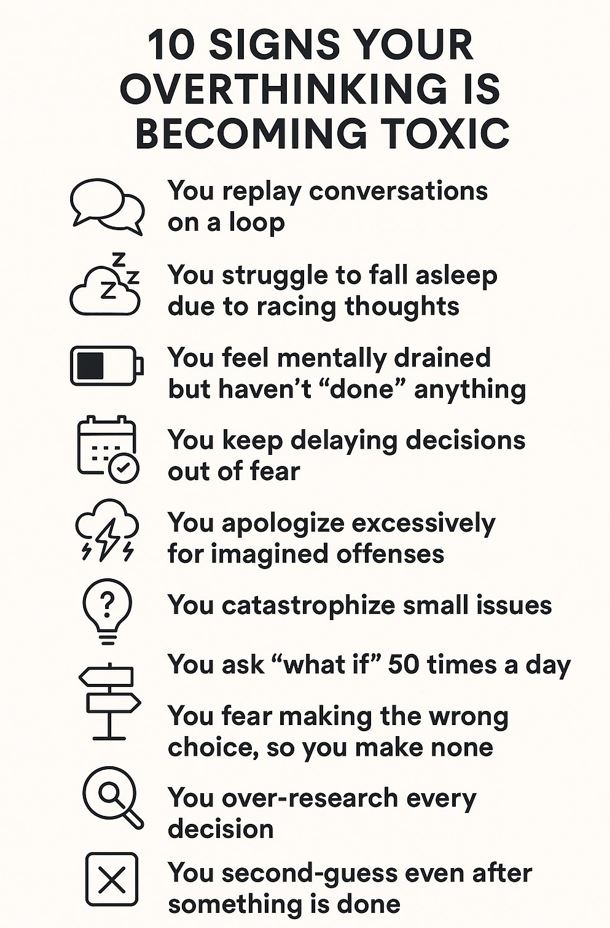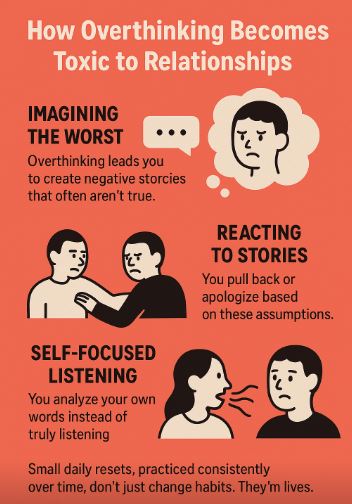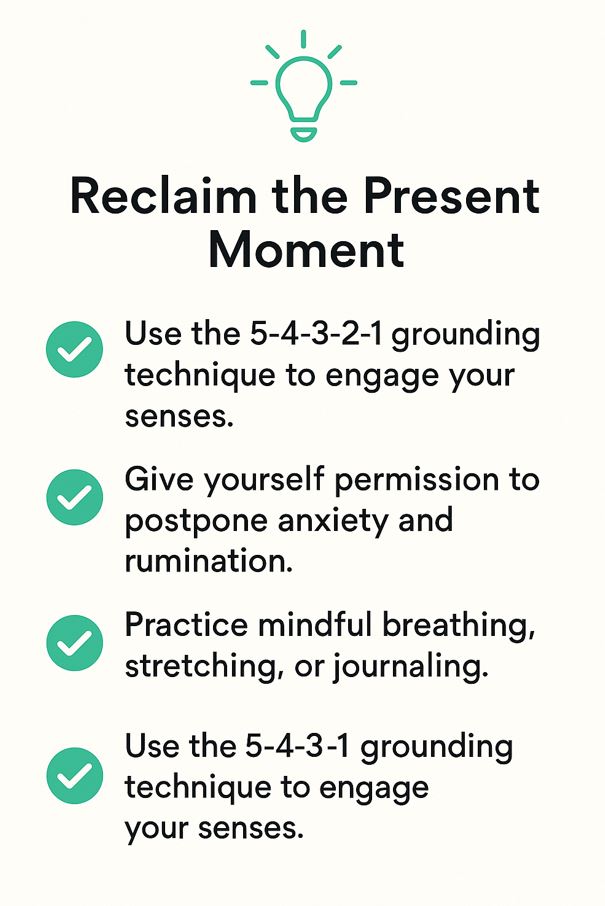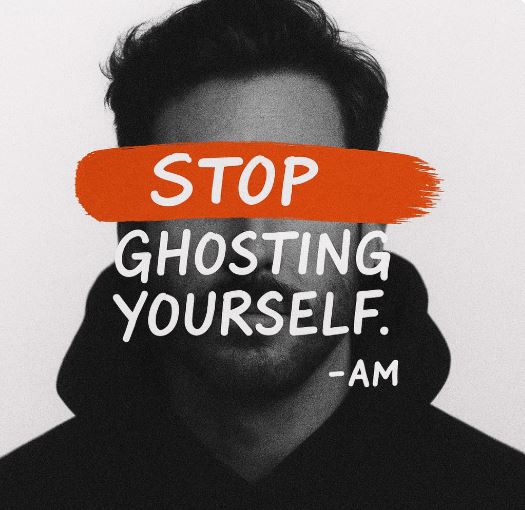Why Overthinking Is Toxic for Your Mind and How to Stop
The best solution isn’t what you’d expect when it comes to overthinking. Most people try to think their way out of thinking too much.
My brain decided to replay that awkward conversation from 2019 at 3 AM last Tuesday. You know, the one where I said “you too” when the cashier said “have a good day with your family” even though I was buying cat food. Alone. For my cat.
Ever wonder why some thoughts stick around no matter how hard you fight them? There’s actually a reason.
Here’s the thing that gets me about overthinking. It tricks you into believing you’re being productive. Like somehow replaying that cringey moment will change the past or prevent future awkwardness.
Spoiler alert: it won’t.
What Makes Overthinking So Toxic
 Overthinking is toxic because it hijacks your present moment. While you’re busy analyzing what happened or predicting what might happen, life keeps moving forward without you.
Overthinking is toxic because it hijacks your present moment. While you’re busy analyzing what happened or predicting what might happen, life keeps moving forward without you.
Think about it like this. Your mind becomes like that friend who insists on reading every Yelp review before choosing a restaurant. Then reads them again, then checks Google reviews, then asks their neighbor’s opinion about the place they’ve never been to.
Meanwhile, everyone else is already eating dinner.
The toxicity isn’t just about wasted time. Overthinking is toxic to your nervous system too, your brain can’t tell the difference between imagined threats and real ones.
So when you spend hours replaying that meeting where your boss seemed annoyed, your body responds like the danger is happening right now. Your heart rate increases. Your muscles tense up. Your sleep gets disrupted. All because of thoughts about something that already ended.
The Sneaky Ways Overthinking Becomes Toxic
Here’s what’s actually happening with overthinking. It creeps in disguised as caring, preparation, or being thorough.
You tell yourself you’re just being responsible by thinking through every possible outcome. But there’s a massive difference between healthy planning and toxic overthinking.
Healthy planning sounds like: “I’ll prepare three talking points for tomorrow’s presentation.” Overthinking is toxic and sounds like: “What if I forget my words? What if they think I’m unprepared? What if that PowerPoint crashes? What if I trip walking to the front?”
See the difference? One moves you forward. The other keeps you spinning in place like a hamster on a wheel.
The sneaky part? Overthinking feels productive because your brain is busy. You mistake mental activity for actual progress.
Why Your Brain Gets Stuck in Toxic Overthinking Loops
 You replay conversations, imagine worst-case scenarios, and analyze every detail until your head hurts.
You replay conversations, imagine worst-case scenarios, and analyze every detail until your head hurts.
Your brain does this because it’s trying to solve problems. The issue is, it’s trying to solve problems that don’t actually need solving.
That embarrassing thing you said three years ago? Already forgotten by everyone except you. That upcoming conversation you’re dreading? You’re creating 47 different versions of something that might not even happen.
Your brain evolved to spot danger and solve problems, but in our modern world, most of our “problems” are imaginary future scenarios or past events we can’t change.
It’s like having a guard dog that barks at shadows all night. The dog thinks it’s protecting you, really, it’s just keeping everyone awake.
Plus, overthinking is toxic because it creates more problems than it solves. You start overthinking about your overthinking.
“Why can’t I just stop thinking about this? What’s wrong with me? Other people don’t seem to worry this much.”
The Physical Toll When Overthinking Is Toxic
Let me be honest with you here. Overthinking is toxic to your body in ways you might not realize. When your mind races, your body follows. Your shoulders creep up toward your ears. Your jaw clenches. Your breathing gets shallow.
You might not even notice until someone points out you look stressed. We accept mental exhaustion but ignore physical warning signs. If your leg hurt every time you walked, you’d see a doctor. But when your mind hurts every time you think, we call that “normal.”
Sleep problems, headaches, digestive issues, weakened immune system. Your body literally starts breaking down from the inside because your mind won’t take a break.
It’s like revving your car engine in park. Sure, it’s running, but you’re not going anywhere and you’re burning through gas fast.
How Overthinking Becomes Toxic to Relationships
 Here’s something nobody talks about enough. Overthinking is toxic to your relationships too.
Here’s something nobody talks about enough. Overthinking is toxic to your relationships too.
You know that feeling when you send a text and they don’t respond within ten minutes? Your brain immediately creates a whole story. They’re mad. They’re ignoring you. They found someone better. They hate that joke you made last week.
Reality? They’re probably in a meeting, or their phone died, or they’re driving.
But overthinking is toxic because it makes you react to stories instead of facts. You start pulling back from people based on imagined scenarios. You apologize for things that don’t need apologies. You create problems that didn’t exist.
Plus, overthinking is toxic to conversations. You’re so busy analyzing what you said, planning what to say next, and worrying about how you’re coming across that you stop actually listening.
Your friend is telling you about their day, but you’re thinking, “Did I sound weird when I laughed at their story? Should I have laughed longer?”
For science-backed strategies to break free from overthinking, check out this expert guide from Verywell Mind.
Simple Ways to Stop Toxic Overthinking
 Here’s where things get practical. You can’t just tell your brain to stop thinking. That’s like telling your heart to stop beating. Not gonna happen.
Here’s where things get practical. You can’t just tell your brain to stop thinking. That’s like telling your heart to stop beating. Not gonna happen.
But you can change your relationship with your thoughts.
First trick: The 5-4-3-2-1 method. When you catch yourself spiraling, name five things you can see, four you can touch, three you can hear, two you can smell, and one you can taste.
This sounds crazy, but it works. Your brain can’t overthink and focus on your senses at the same time. This simple trick brings you into the present moment.
Second: Set a worry timer. Give yourself exactly 15 minutes to overthink whatever you need to overthink. Set an actual timer. When it goes off, you’re done for the day.
Your brain will protest. “But what if we missed something important?” Tell it you’ll worry about it tomorrow during the next 15-minute session.
Third: Write it down, not on your phone, old-school pen and paper. Something about the physical act of writing helps your brain process and release thoughts.
Don’t try to make it pretty or organized. Just dump everything out. You’re not creating a masterpiece. You’re emptying the mental trash can.
The Difference Between Thinking and Overthinking
Here’s what I wish someone had told me earlier. There’s a huge difference between productive thinking and toxic overthinking.
Productive thinking moves you forward. It generates solutions, makes decisions, or helps you learn from experiences. It has a beginning, middle, and end.
Overthinking is toxic because it goes in circles. Same thoughts, same worries, same scenarios played on repeat.
It’s like watching the same movie 47 times hoping the ending will change.
Productive thinking asks: “What can I learn from this?” or “What’s my next step?”
Toxic overthinking asks: “What if?” and “Why did I?” over and over without seeking actual answers.
One feels energizing, even when dealing with difficult topics. The other feels draining and leaves you more confused than when you started.
Creating Mental Space When Overthinking Is Toxic
Sometimes you need to give your brain a vacation from itself. This doesn’t mean ignoring real problems or avoiding important decisions. It means recognizing when thinking becomes unproductive and knowing how to step back.
Physical movement helps. Take a walk without your phone, do jumping jacks, dance. Anything that gets your body moving and breaks the mental loop.
Change your environment. If you’re overthinking in your bedroom, go to the kitchen. If you’re spiraling at your desk, step outside.
Sometimes a change of scenery is enough to shift your mental state.
Talk to someone. Not to solve the problem, but just to get the thoughts out of your head. Often, saying things out loud helps you realize how much energy you’re spending on unlikely scenarios.
When to Seek Help for Toxic Overthinking
Actually, let me back up here. Sometimes overthinking is toxic to the point where you need professional support.
If overthinking interferes with sleep, work, relationships, or daily activities, consider talking to a therapist. They have tools and strategies that go way beyond what any article can provide.
Especially if your overthinking includes thoughts of self-harm or feels completely out of control. That’s not something to handle alone.
Mental health is health. You wouldn’t try to set a broken bone yourself. Don’t try to manage severe anxiety or depression without proper support.
Moving Forward Without the Mental Drama
Here’s the bottom line. Overthinking is toxic because it steals your present moment and gives you nothing useful in return.
You deserve mental peace. You deserve to experience life without constant commentary from your inner critic. You deserve to make decisions without analyzing them to death.
Start small. Pick one area where you tend to overthink and practice letting go. Maybe it’s work emails. Maybe it’s social interactions. Maybe it’s what to wear in the morning.
Notice when you start spiraling and gently redirect your attention. Be patient with yourself. Breaking the overthinking habit takes time and practice.
Your brain has been running this pattern for a while. It won’t change overnight. But it will change if you’re consistent and kind to yourself in the process.
You’ve got this. One thought at a time.
The Hidden Pain Behind Toxic Traits: Where They Come From (Part 2)






